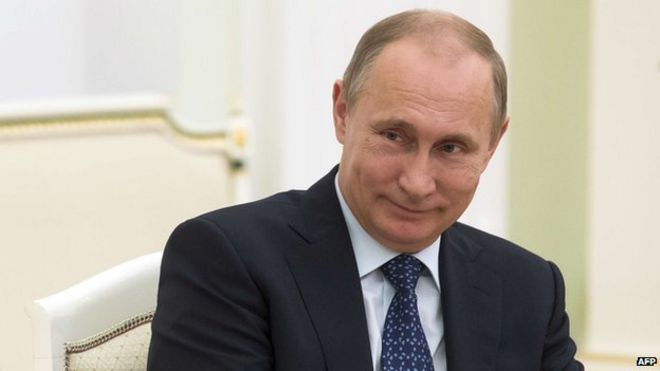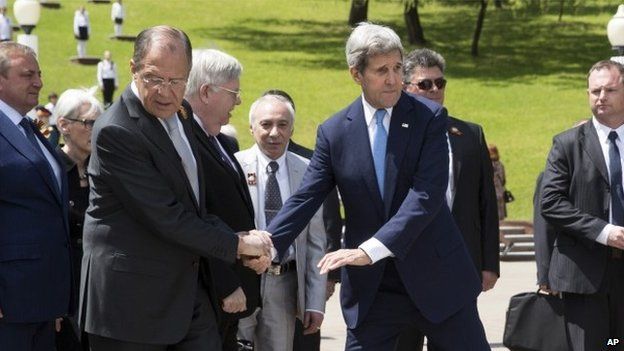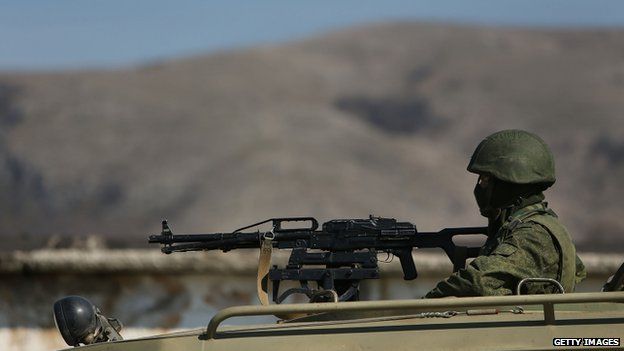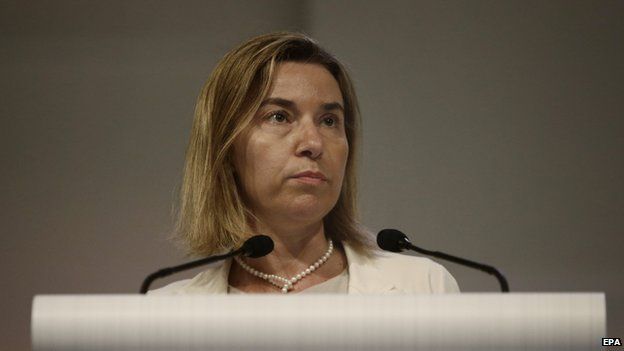bbc.com
- 4 June 2015
- Europe

A report from the Chatham House think tank makes the case for a very different strategy for dealing with Russia - one based on the reality of that country's leadership, rather than unworkable diplomacy.
Why do America and Europe persist with the notion that they can work in partnership with Vladimir Putin? Never mind that he is the only leader since former Iraqi President Saddam Hussein to annex part of another sovereign country, he now appears to be the only major world statesman who has openly supported Fifa president Sepp Blatter.
Western politicians ought by now to have realised that this is not a man with whom they can do meaningful business.
Yet Kremlin misdemeanour after Kremlin misdemeanour, the West keeps returning to the table.
As if US Secretary of State John Kerry, for example, hadn't been humiliated enough by being made to wait for two hours before his last meeting with Mr Putin in Russia, he was back again two weeks ago in Sochi.
The purpose of that trip is a worrying mystery:
- either he was trying to negotiate a solution with his Russian counterpart, Sergei Lavrov - and there is no solution that meets the interests of both Russia and Ukraine
- or he was putting the final touches to a shabby deal already done giving Russia what it wants
We don't yet know which.

New strategy
This recognition the Western response to the Ukraine crisis has been a series of short-term, tactical steps (by no means all of them wrong) lacking a strategic context has inspired a Chatham House report.
The Russian Challenge's six authors propose a markedly different strategy.
Appeasing the Russian leadership hasn't worked in the past, and it won't work now. It's wrong in principle, and it's bad policy to boot.
If the West does (or already has done) some kind of backroom deal with Russia, allowing it a Cold War sphere of influence around its borders, this condemns millions of people in several supposedly independent former Soviet countries to a return to domination by Moscow.
But even this would bring little improvement in East-West relations.
The Russian leadership believes these countries are theirs.
The West would not get so much as a thank you - just like the last time this terrible mistake was made, in Yalta during World War Two.
The Russian Challenge makes the case for an entirely new set of policies.
They will not replace the regime in Russia.
The West does not have that capability anyway.
Recommendations
However, the policies outlined will deliberately make life less comfortable for the Russian leadership, as a response to its highly controversial pursuit of what it sees as its natural right to dictate terms to Ukraine.

These policies would include:
- reaffirming commitment to the full sovereignty of the post-Soviet independent states at every opportunity
- finding new ways to communicate with the wider population of Russia so that it is in their interests to be part of a rules-based Europe
- supporting the reconstruction of Ukraine and the development of all other post-Soviet states
- depriving Russia of leverage in EU energy markets
- countering Russian propaganda, as well as restoring more conventional deterrent capabilities
- regenerating Russian expertise so as to better understand and predict Russia's actions
- maintaining sanctions for as long as Russia remains illegally in Ukraine
- preparing for the eventual and inevitable change of regime in Russia (be it an improvement or a deterioration)
The recommendation on sanctions needs urgent attention, as the decision on extending or relaxing them comes up this month.
The duration of sanctions is at least as important as their severity.
Again, they are not designed to do the impossible - change Vladimir Putin's mind - and they most certainly should not represent the totality of the Western response.
But they are what mature nations do when confronted with aggression, as opposed to descending to an aggressor's level and responding in kind.
Optimism not a strategy
A recent Chatham House paper argued this was not another Cold War.
Russia has retained some of the characteristics of its Soviet predecessor, but it is no longer a global superpower.
The simple fact is the end of the Cold War resulted in liberation and independence for the former Soviet republics - but it is this fact Russia, and President Putin personally, now do not wish to recognise.

Russia continues to argue a moral equivalence between its actions and those of the West.
But from providing weaponry Western nations believe shot down a Malaysian airliner, killing 298 people (which Russia denies), to suppressing dissent and the liberal media, to making the deaths of its young soldiers once again a state secret, Russia demonstrates time and again it has no place among the Western community of civilised nations.
Russia has just banned 89 supposedly "hostile" EU citizens from entering its territory. Western policy should not react to such day-to-day events.
In a speech in February, the head of the European Union External Action Service, Federica Mogherini, was asked repeatedly what the EU's response should be if the situation deteriorated.
Three times Ms Mogherini replied she was an optimist - but gave no indication there was any strategy beyond this.
Now, unsurprisingly, the situation has deteriorated. Optimism is clearly not a strategy.
But with just a small amount of political will, the new set of more robust policies recommended by the Russian Challenge can induce a better relationship with Russia in the longer term.
James Nixey is head of the Russia and Eurasia Programme at Chatham House.
1 comment:
Europe when it comes to activity they are very persistent. I enjoyed reading your blog...
Great data for Park City Homes
Post a Comment